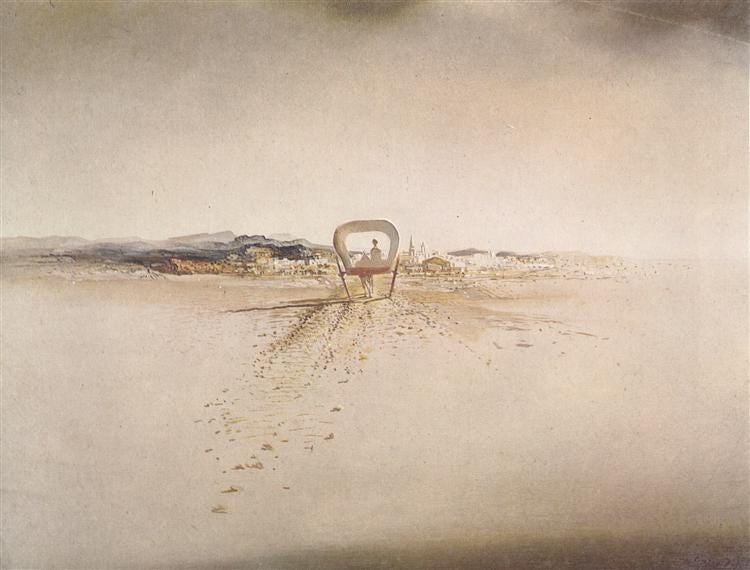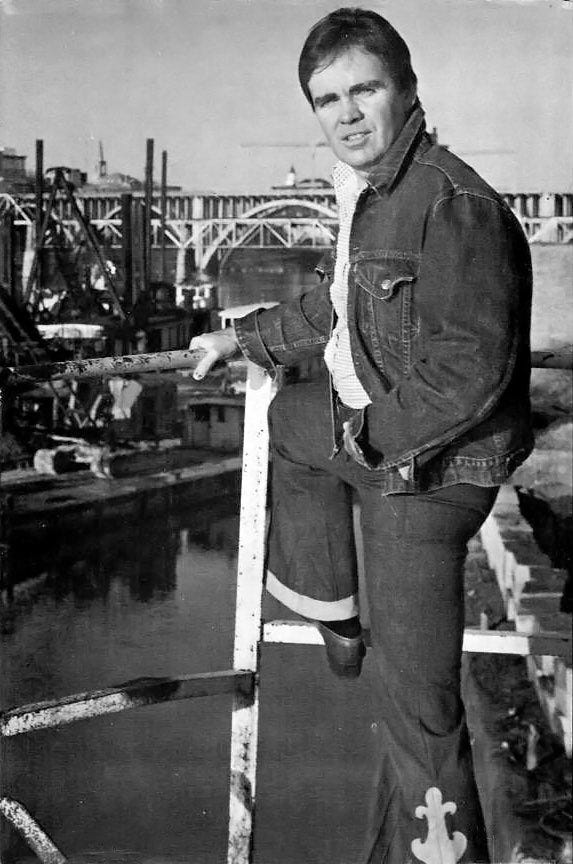Cormac McCarthy is Dead
Another master content creator taken too soon.
The experience I had yesterday morning upon learning of Cormac McCarthy’s death at age 89 was strange, maybe even surreal.
Christina was in the bathroom, putting on makeup before a Zoom call. “Oh my God, Barret!” I assumed she was going to tell me to come look at one of the cats, force me to agree how ungodly cute he was, and assent to his prompt euthanasia. Instead her footsteps crossed toward the kitchen.
“Barret,” she said, her voice suddenly low, solemn. “I have something to tell you.” Was she going to stop and see her dad in the Valley after her shift at the wildlife rehab center? Had she decided it was best that we broke up? Either might have made sense. I was busy then writing social media captions for a dental office in Michigan; the work always put me in a somber mood. “Happy Summer! ☀️🌴 Are you ready to shine? ✨ Flaunt your most radiant smile as you step into beach season. Take advantage of our limited-time Laser Zoom Whitening!”
“Cormac McCarthy is dead,” Christina said, glancing up from her phone.
“Wow,” I said, minimizing the window. I could see Christina was not smiling. “You serious?” My favorite writer, the greatest living wordsmith in English, he’d succumbed just like that, alone one random Monday in his house in Santa Fe? Christina sighed and I briefly met her eye but then I had to look away. The emotion was too powerful. “Fuck.” I’d never experienced anything quite like it before. I don’t know where the feeling came from exactly. I knew the dude was old, but I never imagined that when the moment came I’d find myself standing there mumbling obscenities, the muscles around my mouth contracting, tightening suddenly into…
A smile. “Dead?” I couldn’t control it. Somehow I was fighting back laughter.

And all afternoon, as my phone went on dinging with texts from friends, acquaintances, and several enemies I hadn’t insulted in years, each and everyone forwarding me, the faux aficionado of Cormacian cruelty, the flood of headlines from Yahoo, Fox News, NPR, CNN, CBS, USA Today, ABC, The Atlantic, NBC, People, Esquire, The New Yorker, Washington Post, Guardian, Rolling Stone, Variety, Vox, The LA Times, and New York Times, for the first time in my life I felt a hint of that suspicion that’s gripped the hearts of so many Americans in recent years, those free thinkers who might fancy themselves characters in some Cormac McCarthy western novel, assuming any of them read actual fiction: Fake, I thought. Fake.
“Cormac McCarthy, Novelist Who Explored an Apocalyptic American West, Dead at 89.”
Fake News.
Although it wasn’t precisely the word fake that bobbed to mind. More so it was a feeling, a funny suspicion of something foul afloat in the wash of headlines. A nude mannequin maybe. Not the actual master of the violent revisionist western. Just a hoax. “Cormac McCarthy, American novelist of the stark and dark, dies at 89.”
“He died,” Christina said. “It’s right here in the New York Times.”
“I can’t believe it,” I said, attempting to conceal my smile as I stared off out the window at the alley. A young man in a leather corset stood inside one of the dumpsters sobbing as he fished an empty soy milk bottle from the piles of bloated plastic. Had word of the greatest living American writer’s not-so-untimely demise finally pinged his phone?
“It’s crazy,” Christina said. She flicked another article away and then froze, staring at me across the table. “Are you… chuckling?”
It would have made sense for her to tell me that she wanted to break up, especially considering the fact that I’d recently confessed on my crappy blog that it was her, not some representative of the Boeing Corporation, that derailed my second book in the summer of 2018, forbidding me from writing any further upon pain of violent death.
It would have made sense, too, for her to stop in the Valley and drink a beer with her dad after feeding baby owls bits of chopped up mice in Malibu all afternoon. Nothing like two double IPAs to cleanse the olfactory of the alkaline reek of frozen rodent meat.
What did not make sense was to tell me that Cormac McCarthy was dead.
“I’m not laughing. I’m just—smiling,” and with that Christina seemed soothed. “I’m not sure why.”
“You loved him so much,” she said, taking hold of my hand and squeezing.
She loved him too. And that love, it occurs to me now, might explain how she’s managed not to murder me. Perhaps, in some hideous roundabout, by making my book about the nuclear meltdown infinitely more difficult to write than it might have ever been, she’s actually been attempting over the years to prove to me, through excess misery, that it is worth doing.
Or as McCarthy put it in a 1985 interview following the release of his grueling masterwork, Blood Meridian, in a quote that Christina’s long been familiar with:
“Anything that doesn't take years off your life and drive you to suicide hardly seems worth doing.”
Cormac McCarthy, more than any other living writer I’ve read, proved that the writing was worth doing. Ralph Ellison, author of the classic Invisible Man, agreed, and he worded it well in that famous blurb on the front of every paperback: “McCarthy is a writer to be read, to be admired, and quite honestly—envied.” No one did it better than McCarthy, whatever it is, but to talk of envy does feel somehow awry and awkward now. You cannot envy the last in the line of species soon to be extinct, an endling as its termed.
And McCarthy was just that—an endling.
Whatever he was doing is not something human beings are likely to encounter again. Certainly not in this late epoch of infinite content and distraction, an age full of the hysteria of ‘fake news’ and relative truth, with artificial general intelligence emerging alongside global climate meltdown, all of these maladies and breakthroughs and false truths competing for attention alongside the old guard of art and literature, beauty and hummingbirds, elephants and Spanish mackerel, tigers, trans teens and whatever other sad beasts still seek to eke out an existence in some increasingly crowded corner of our rapidly rotting world—certainly, in this context, there may never again arise a writer like Cormac.
“This is just entry level to what’s coming,” McCarthy himself said. “Just the appalling volume of artifacts will erase all meaning that they could ever possibly have. But we probably won’t get that far.”
But even if technology had never irreparably deranged our existence and diluted all articulation into what amounts now to one permanent choking sob, barely perceptible, at the fringe of our awareness as iOS automatically updates through the night—there still may never have arisen one more master like McCarthy.
But he did appear, the last perhaps of a long line, a giant in world literature, a towering genius, his immortality hardly a matter of question.
You loved him so much... Yes. And I was smiling on Monday not because of his critical acclaim or my obvious envy, nor for all those summers, the afternoons and evenings I spent reading each of his books on mountain rocks and tattered sofas, my fingers carefully turning the pages as they pried open my eyes, the wind from their fall lifting some forgotten chunk of myself out from the room, over the rooftops and woods on a whirl of language at once cold and incantatory, so slithering and vivid, as dripping and deadly, familiar and foreign as the first saliva-slaked word hurled from the human heart some moonless night alone on the African savannah as the hyenas circled and the lava slid out to sea—No.
It was not the memories of reading McCarthy that made me giddy yesterday upon the news of his death.
It was not the $1, the $2, or even $7, $8, $9 million sentences that frequently explode in the midst of his paragraphs, not the wide readership that found him long after his first works fell out of print, nor the cheerful, unpretentious demeanor so charming and contrary to impenetrable mastery of his prose. None of this made me smile.
It was something else. A totally new experience in my life. An internal conflict. And one I did not hate. An intimate dramatic irony, you might say. Everyone was telling me something, claiming the same stupid thing, and I felt it was patently false, and yet the discord brought me no bitterness, just embarrassment. I simply had to laugh.
Cormac McCarthy, Novelist of a Darker America, Is Dead at 89.
Of course, there’s no more cliché concept than the idea of living on forever through one’s art. Yet I think it was the sudden stubborn power of this old platitude that made me smile on Monday, the day I heard he died. McCarthy, a writer who never once committed a single cliché to paper, secured for himself, across his thousands of flawless pages, the tedious and timeworn title of ‘the immortal writer.’ It is the great comic paradox of his endling status—the great oracle of our destruction, erasure, and meaningless preserved for us, more than anyone, an appreciation of the awesome power of language, and for himself, a place among the immortal pantheon.
It makes me smile to imagine him, the cheerleader of doom, dancing off the stage, the headlines screaming as the curtain falls and the credits roll. Dead. Dead. Dead. For me the news was a source of laughter, as it must be for McCarthy, wherever he is now, doing whatever it is he does there. There has probably never been another writer more obsessed with death, and to hear news of his passing could be an occasion for solemn reflection, but McCarthy carefully undermined his own prophecies.
He is probably the last one capable of such a magic act. Someone who taught us so much of what it means to live doesn’t go disappearing that fast. And it was this surreal, sudden sensation of the man’s definitive and uncanny endurance that made me smile involuntarily. But it is Cormac McCarthy who gets the last laugh.
Those who love him know that there was nothing quite like his relentless pessimism to light a fire under your ass.
It is the ancient law of reversed effort. The more you negate the more you affirm. RIP.
“Keep a little fire burning; however small, however hidden.”




😥